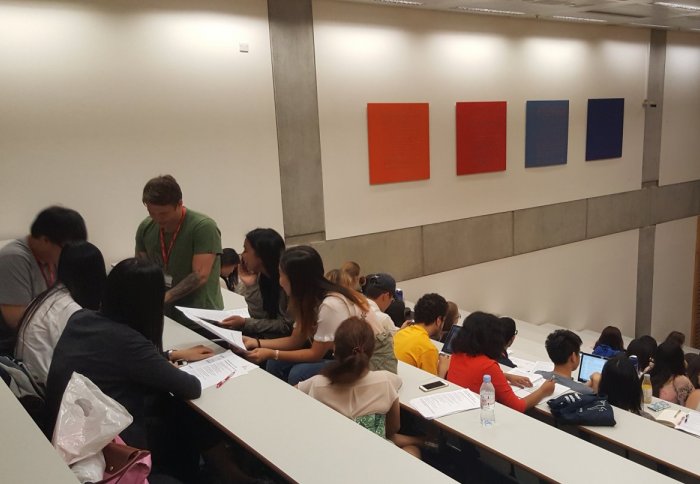Introducing collaboration on AMR to a new generation of students

Imperial's ARC & EMBRACE collaborations joined forces with the School of Public Health to deliver a day with a focus on AMR at the Summer School
The 2016 Faculty of Medicine Summer School, Revolutions in Biomedicine, brought together bioscience and medical students from all over the world. Through lectures, interactive group work and laboratory research projects they covered topics as diverse and wide-ranging as stress to big data. On the penultimate day of the school, the EMBRACE team joined forces with Dr Mariam Sbaiti from the School of Public Health to deliver a day on Antimicrobial Resistance & Global Health.
The day commenced with an introduction to antimicrobial resistance (AMR) from Dr Maryam Modarai (EMBRACE fellow, department of Medicine). This charted the discovery and widespread implementation of antibiotics to treat bacterial infections (a true revolution in biomedicine!), the emergence of resistance infection and the mechanisms by which they arise, and the potential post-antibiotic era that we face today. This was followed by two research talks from Imperial’s Antimicrobial Resistance Collaborative (ARC) fellows, Dr Martina Valentini and Dr Myrsini Kaforou. Both talks focused on specific areas of research within the field of AMR that are currently being undertaken at Imperial College, introducing the students to current research topics and giving insight into the world of biomedical research.
Dr Martina Valentini outlined how biofilm formation promotes the emergence of bacterial resistance and how this is a significant problem in areas such as hospital-acquired infections and lung infections in Cystic Fibrosis patients. Martina also discussed how understanding the mechanisms involved in biofilm development better could lead to the development of novel approaches to combating bacterial biofilms. Dr Myrsini Kaforou talked about the need for quicker and more reliable methods of diagnosing Tuberculosis (TB) infections. Tuberculosis effects an estimated 1 in 3 of the world’s population and the incidence of drug-resistant TB is an increasing problem. Myrsini described her research into developing a new diagnostic technique using genetic biomarkers to develop a “signature” of TB infection with the aim of producing a method of diagnosis that is both more specific and sensitive than those currently used.
The three presentations were followed by a stimulating panel discussion with the speakers as well as Dr Mariam Sbaiti and Dr Lindsay Evans (EMBRACE fellow, department of Chemistry). This gave the students an opportunity to ask questions about AMR in the broader context and promoted discussions between the panel and students. Important topics such as the economic reasons behind the lack of new antibiotics coming to market in the last 30 years, the effects of unregulated antibiotic use, and why bacteriophages, which are a popular alternative to antibiotics in countries such as Russia, are not used worldwide were discussed.
The afternoon session explored AMR in the context of global health. Dr Mariam Sbaiti worked with Dr Lindsay Evans to deliver a team-based learning exercise linking the two research themes. Dr Sbaiti then delivered a lecture introducing the audience to the field of global health, using drug-resistant TB to exemplify the complex problems and multifaceted causes of global health issues. The day concluded with an interactive summary session where the students were asked to summarise the key learning outcomes from the day and how factors associated with AMR and global health interplay.
The day was highly successful in fulfilling its aims of engaging the next generation of scientists and medics on the threat of AMR and the complex problems that feed into global health issues. The students particularly enjoyed hearing about the cutting-edge research at Imperial College and the opportunity for discussion with people working in these important research areas. This event was also a fantastic opportunity for those involved in the day, giving experience of collaborating with multiple departments to deliver a focused day of interdisciplinary teaching.
Article text (excluding photos or graphics) © Imperial College London.
Photos and graphics subject to third party copyright used with permission or © Imperial College London.
Reporter
Lindsay Evans
Department of Infectious Disease
Anna Skordai
Department of Infectious Disease